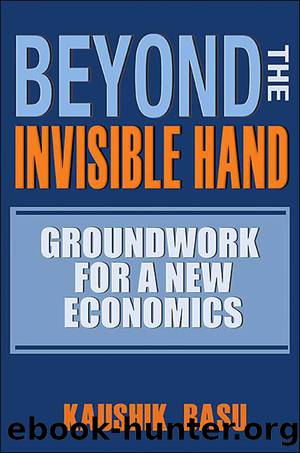Beyond the Invisible Hand by Basu Kaushik;

Author:Basu, Kaushik;
Language: eng
Format: epub
Publisher: Princeton University Press
Published: 2011-08-15T00:00:00+00:00
Coercion and Voluntariness
In trying to understand coercion and voluntariness, the risk that many an analyst has succumbed to is that of falling into the tautological or near-tautological trap: seeing virtually all human behavior as examples of free choice or all behavior as an illustration of coercive action. The conservative neoclassical economist often bends over backward to show that virtually all choice is noncoercive. This is because, as David Zimmerman (1981, 122) pithily puts it, âSocialists and laissez-faire liberals alike . . . have embraced the conviction that coercion is prima facie morally wrong.â Given this, to admit coercion is to concede the need for government intervention. As Zimmerman notes on the same page, âIf capitalist wage bargains did involve coercion, that would be one moral strike against them.â Yet it is equally possible to err on the other side by jumping to conclude that coercion has occurred.
Suppose some workers choose to work in a low-paid hazardous industry. Did they choose this voluntarily? The correct answer is: We cannot say; we need more information about the circumstances before we can pronounce a judgment. So let me add to the above description the fact that these personsâ only other option was unemployment, which would leave them abysmally poor. To some social scientists, this is enough information to be able to say that they did not make a voluntary choice because, effectively, they had no choice, since being unemployed is not really something one chooses (Macpherson 1973). On the other hand, there is a liberal position, best exemplified by Robert Nozick (1974), that argues that if other agents acted voluntarily and within their rights, then the worker can be described as having chosen voluntarily and without coercion. This is also wrong but for more complex reasons.
I am asserting here that both these positions are flawed (which shows that while my position will be Nozickian in some ways, it is not that of Nozick). With the information we have thus far, strictly, we cannot say whether the workers were coerced or not. The qualifier âstrictlyâ is important here. If we did indeed have this much information and no more, and we had to take a position on this, I would be inclined to treat this as a case of voluntary choice, since the accompanying conditions that we need for this to be construed as coercion (as we will presently see) seem empirically unlikely.
Those who race to conclude that this is a case of coercion, usually take the view that the âchoiceâ of being unemployed is not a serious one. They feel that no one should have to take a miserable job. But the mistake with this is its implicit tendency to assume that if âno one should have to take such a miserable job,â then âsomeone taking such a jobâ must imply coercion. This and the opposite error of quickly concluding that this is voluntary can curiously stem from the same basic mistake: the tendency to equate âhaving choiceâ with ânot being coerced.â
Since I
Download
This site does not store any files on its server. We only index and link to content provided by other sites. Please contact the content providers to delete copyright contents if any and email us, we'll remove relevant links or contents immediately.
International Integration of the Brazilian Economy by Elias C. Grivoyannis(111059)
The Radium Girls by Kate Moore(12028)
Turbulence by E. J. Noyes(8049)
Nudge - Improving Decisions about Health, Wealth, and Happiness by Thaler Sunstein(7707)
The Black Swan by Nassim Nicholas Taleb(7129)
Rich Dad Poor Dad by Robert T. Kiyosaki(6632)
Pioneering Portfolio Management by David F. Swensen(6300)
Man-made Catastrophes and Risk Information Concealment by Dmitry Chernov & Didier Sornette(6019)
Zero to One by Peter Thiel(5802)
Secrecy World by Jake Bernstein(4753)
Millionaire: The Philanderer, Gambler, and Duelist Who Invented Modern Finance by Janet Gleeson(4478)
The Age of Surveillance Capitalism by Shoshana Zuboff(4292)
Skin in the Game by Nassim Nicholas Taleb(4248)
The Money Culture by Michael Lewis(4207)
Bullshit Jobs by David Graeber(4190)
Skin in the Game: Hidden Asymmetries in Daily Life by Nassim Nicholas Taleb(4007)
The Dhandho Investor by Mohnish Pabrai(3765)
The Wisdom of Finance by Mihir Desai(3747)
Blockchain Basics by Daniel Drescher(3583)
